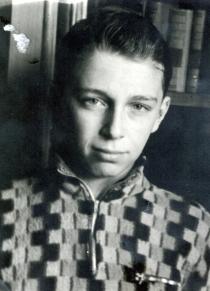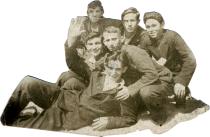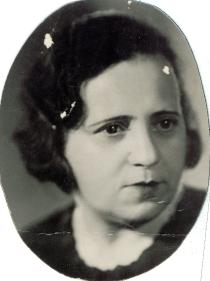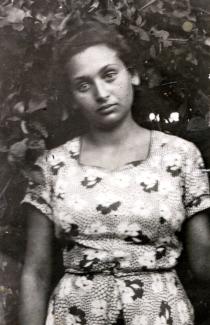This is a picture of me and my friends, members of the Jewish youth organization, the Betar. Regretfully, I don't remember their names. I am the one on the right in the 2nd row. This picture was taken in Chernovtsy in 1936 before one of my friends left for Palestine.
I finished grammar school in Vizhnitsa in 1934. I moved to Chernovtsy and went to grammar school there. I studied there 4 years, from the 5th to the 8th grade. The majority of students at this grammar school was Jewish. The attitude towards Jews was very good. There was no national segregation in those years. I had many Ukrainian, Romanian and German friends at grammar school. However, in 1935 the Germans stopped socializing with us, even the ones who had been good friends before. They stopped greeting us, and so on. Romanians behaved in a normal way until the beginning of the war. The Germans lived in Rosha, in the outskirts of Chernovtsy. After 1935 Jews didn't go to Rosha in the evening because they were afraid to be abused.
During my studies at grammar school I joined the Betar. It was a right-wing Zionist organization. There was strong Zionist propaganda at that period. They said Jews had to live in Palestine, sing Jewish songs and have military training.
Senior members of the Betar wanted to go to Palestine. Those who wanted to move there had to work for a landlord for about a year to learn farming. Upon completion of this course they obtained a certificate and could move to Israel. The British Embassy issued those certificates. It was their requirement to have this certificate attached to the package of submittals. However, this was just another requirement to restrict entrance to Palestine. They actually wanted to turn Palestine into their colony. The borders of Arabian countries were open, and Jewish capitalist entrepreneurs went to Palestine creating new jobs. Arabs were free to go to Palestine, but Jews had restrictions. We can witness the consequences of this policy now. It's the fault of the English. The League of Nations issued the mandate to England to found a Jewish state, but it failed to perform this task.
One could go to Palestine from the age of 18. Some of my acquaintances from Betar left. I don't remember their names, though. There was a hakhsharah center in Chernovtsy, up the street from the Town Council. Those, who intended to move to Palestine, got registered there and waited for a permit because only a restricted number of people could go to Palestine. There were many people willing to go there, but only few obtained permission. I didn't want to leave my family and friends and my country. Our friends from Palestine wrote about their hard life and work, the difficult climate, malaria, the lack of water and the simplest comforts. But they came to like this country and were enthusiastic about changing their lives for the better.




